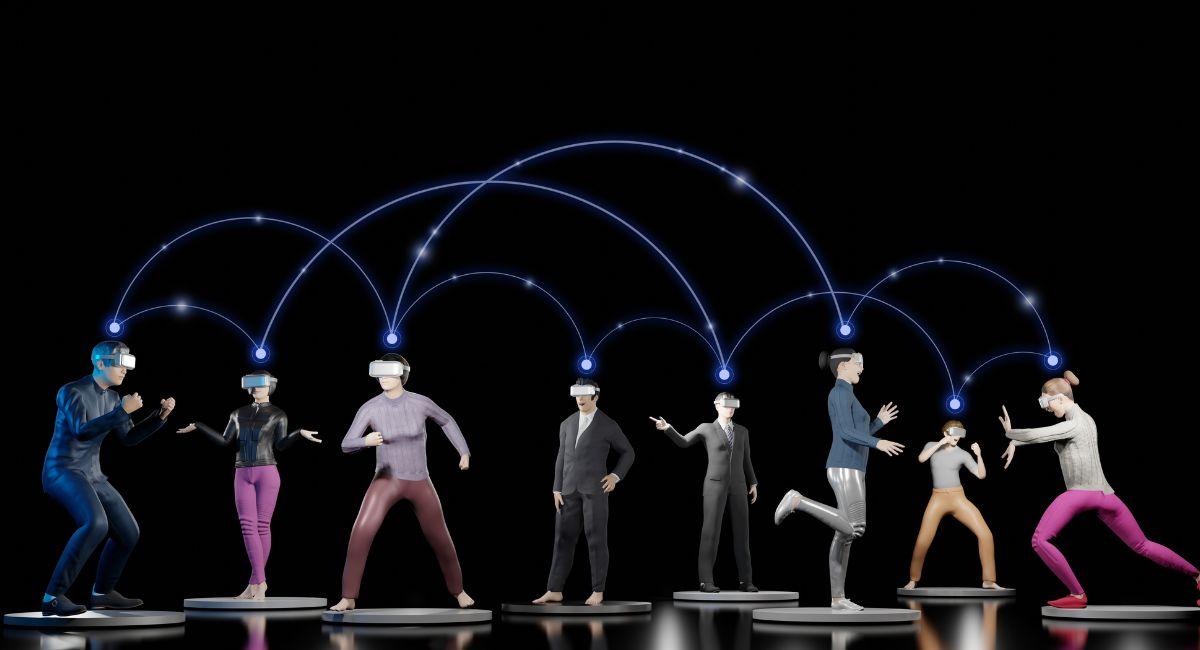Top 5 Ways In The Metaverse To Understand Multifaceted Dimensions of Value

The Metaverse, a term once confined to the realms of science fiction, has emerged from the shadows of imagination to become a transformative force in the digital landscape. Beyond its technological underpinnings and futuristic aesthetics, the concept of the Metaverse is intricately tied to the notion of “value.” In this comprehensive exploration, we embark on a journey to unveil the essence of the Metaverse, dissecting its multifaceted dimensions and delving into the various ways in which value is created, perceived, and exchanged within this digital realm.
Defining the Metaverse:
Before delving into the intricacies of value within the Metaverse, it’s essential to understand what constitutes this immersive digital space. The Metaverse can be described as a collective virtual shared space that encompasses the entirety of digital twins of our physical reality. It is not confined to a single virtual world but is rather a network of interconnected digital spaces, each offering unique experiences and opportunities.
The Multifaceted Dimensions of Value:

The Metaverse, a sprawling digital frontier where the virtual and the real intertwine, is not merely a canvas for technological innovation; it is a complex ecosystem where the notion of “value” takes on multifaceted dimensions. In this exploration, we unravel the intricate layers of value within the Metaverse, recognizing that it extends far beyond traditional economic metrics, encompassing diverse realms of ownership, social interaction, experiential richness, and the innovative fusion of digital and physical domains.
1. Digital Assets and Ownership:
At the core of the Metaverse’s value proposition lies the ownership of digital assets. These assets span a broad spectrum, including virtual real estate, digital art, in-game items, and cryptocurrency. Ownership in the Metaverse is not confined to physical constraints; it extends to unique, digitally scarce assets that confer a sense of exclusivity and value to their possessors.
Key Attributes:
- Scarcity: Digital assets, often tokenized as NFTs, imbue a sense of scarcity, enhancing their perceived value.
- Exclusivity: Ownership in the Metaverse translates to exclusivity, creating a new dimension of value distinct from the physical realm.
2. Economic Value and Virtual Economies:
The Metaverse boasts its own set of economic principles, fostering the development of virtual economies. Participants engage in buying, selling, and trading virtual goods and services, shaping a dynamic economic landscape where traditional rules are rewritten, and new opportunities for value creation emerge.
Key Attributes:
- Decentralization: Virtual economies often operate on decentralized principles, introducing novel ways of value exchange outside traditional financial systems.
- Global Connectivity: The Metaverse transcends geographical boundaries, enabling global economic interactions and diversifying economic value creation.
3. Social Capital and Reputation:
In the social fabric of the Metaverse, value extends beyond economic considerations to encompass social capital and reputation. Virtual communities provide a stage where individuals build reputations based on contributions, skills, and interactions, creating social value that can translate into influence and opportunities.
Key Attributes:
- Meritocracy: Social interactions within the Metaverse often follow a meritocratic model, where individuals accrue value based on their contributions to the community.
- Network Effects: Reputation gains momentum through network effects, influencing the opportunities available to individuals within the digital social ecosystem.
4. Experiential Value:
The immersive nature of the Metaverse contributes to its experiential value. Virtual events, concerts, interactive simulations, and collaborative environments offer unique experiences that transcend traditional forms of engagement, enriching the digital tapestry with layers of experiential value.
Key Attributes:
- Immersive Technologies: Advancements in AR and VR technologies elevate the level of experiential value, making interactions within the Metaverse more lifelike and engaging.
- Novel Experiences: The Metaverse serves as a canvas for novel experiences, from virtual travel to interactive storytelling, contributing to the richness of experiential value.
5. Innovations in Work and Collaboration:
The Metaverse is redefining the nature of work and collaboration. Virtual offices, collaborative platforms, and shared workspaces introduce new dynamics where value is derived from increased efficiency, global connectivity, and innovative approaches to problem-solving.
Key Attributes:
- Global Collaboration: The Metaverse facilitates global collaboration, enabling teams to work seamlessly across geographical boundaries.
- Digital Innovation: The collaborative nature of the Metaverse fosters digital innovation, leading to the creation of novel solutions and value propositions.
Also, read – Your Quick Read To The relationship Between Metaverse Gaming And Cryptocurrency
Digital Scarcity and Tokenization in the Metaverse:

Within the expansive realms of the Metaverse, where digital landscapes mirror the complexities of our physical world, a crucial concept emerges as a cornerstone of value: digital scarcity. This principle, intertwined with the process of tokenization, reshapes traditional notions of ownership and value within this digital frontier. In this exploration, we delve into the profound implications of digital scarcity and tokenization, unraveling how they underpin the essence of value in the Metaverse.
Digital Scarcity Defined:
Digital scarcity is a fundamental departure from the infinite replicability of digital assets in the traditional online space. It introduces the concept that certain digital items or assets are intentionally limited in quantity, much like rare physical objects in the real world. This scarcity creates a perception of exclusivity and uniqueness, contributing to the perceived value of digital entities.
Tokenization: Bridging the Physical and Digital:
Tokenization acts as the bridge between the physical and digital worlds within the Metaverse. It involves representing ownership or proof of authenticity of a digital or physical asset through a cryptographic token, typically facilitated by blockchain technology. Non-Fungible Tokens (NFTs) are a prominent example of tokenization in the Metaverse, serving as unique, indivisible units that represent ownership of specific digital assets.
Key Aspects of Digital Scarcity and Tokenization:
**1. Unique Digital Assets:
- Distinctiveness: In a tokenized environment, each digital asset becomes a unique entity. Whether it’s a virtual piece of real estate, digital artwork, or an in-game item, the tokenization process ensures its distinctiveness.
**2. Immutable Ownership Records:
- Blockchain Assurance: Tokenization relies on blockchain technology, providing an immutable and transparent ledger of ownership. Once a digital asset is tokenized, its ownership history is securely recorded, preventing unauthorized alterations.
**3. Creation of NFTs:
- Indivisibility: NFTs, as a form of tokenization, are indivisible. They cannot be divided into smaller units, ensuring that each NFT represents the whole and retains its unique characteristics.
**4. Smart Contracts and Programmability:
- Programmable Functionality: Smart contracts, integral to tokenization, imbue digital assets with programmable functionalities. This includes predefined conditions for transfers, revenue-sharing mechanisms, or even interactions within virtual environments.
Implications for Value in the Metaverse:
**1. Perceived Rarity and Exclusivity:
- Enhanced Value Perception: Digital scarcity, manifested through tokenization, creates a sense of rarity and exclusivity. Users perceive tokenized assets as unique and valuable due to their limited availability, fostering a heightened sense of ownership.
**2. Monetization and Digital Economies:
- Economic Opportunities: Tokenization enables the monetization of digital assets within the Metaverse. Creators can tokenize their work, allowing for direct ownership and monetization through sales or licensing. This process contributes to the development of robust digital economies.
**3. Interoperability and Cross-Platform Transactions:
- Interconnected Value: Tokenization fosters interoperability, enabling seamless transactions of digital assets across various platforms and virtual worlds. This interconnectedness contributes to a unified Metaverse economy, amplifying the overall value of tokenized assets.
**4. Cultural and Artistic Expression:
- Artistic Value: Tokenization empowers artists and creators to showcase their work in the digital realm, with each piece carrying its own NFT. This process not only preserves the uniqueness of digital art but also introduces new avenues for artistic expression and recognition.
Certainties:
– Next product to cause huge growth in web3? 2017 was ICOs, 2021 was NFTs – 2024? NFTs again
– Hundreds of billions will flow into BTC ETFs as normies allocate to BTC
– All forms of value, both physical and digital, will be traded on-chain as NFTs
– The digital…
— Andrew “The Metaverse Guy” Steinwold (@AndrewSteinwold) December 28, 2023
Challenges and Considerations:

As the Metaverse captures the imagination of creators, users, and investors alike, its ascent to prominence is accompanied by a myriad of challenges and considerations. These intricacies not only shape the trajectory of the Metaverse but also significantly impact the perception of value within its digital confines. In this exploration, we delve into the multifaceted challenges and considerations that cast shadows on the luminous potential of the Metaverse.
**1. Interoperability:
- Challenge: One of the primary challenges facing the Metaverse is the issue of interoperability. As various platforms and virtual worlds proliferate, seamless interactions and value transfer across these diverse environments become essential. The absence of standardized protocols for communication and asset transfer poses hurdles in creating a unified and interconnected Metaverse.
- Consideration: Establishing industry-wide standards for interoperability is imperative. Collaborative efforts to create protocols that facilitate the smooth exchange of assets, data, and experiences between different virtual spaces will contribute to a more cohesive Metaverse.
**2. Digital Identity and Privacy:
- Challenge: The Metaverse relies on digital identities that intertwine with ownership records and personal data. This convergence raises concerns about privacy and security, as users navigate virtual environments and engage in transactions within the Metaverse.
- Consideration: Addressing privacy concerns necessitates the development of robust frameworks that prioritize user control over personal information. Striking a balance between transparent ownership records and safeguarding individual privacy is crucial for fostering trust within the Metaverse.
**3. Regulatory Landscape:
- Challenge: The evolving nature of the Metaverse challenges existing regulatory frameworks, particularly in areas related to virtual property ownership, transactions, and digital currencies. The absence of clear regulations can lead to uncertainties and legal ambiguities.
- Consideration: Establishing comprehensive regulatory frameworks tailored to the unique features of the Metaverse is essential. Collaboration between industry stakeholders and regulatory bodies can pave the way for guidelines that ensure the legitimacy, security, and ethical use of virtual assets.
**4. Content Moderation and Governance:
- Challenge: Content moderation within the Metaverse is a complex task, considering the vastness and diversity of user-generated content. Issues such as inappropriate behavior, intellectual property violations, and illegal activities pose challenges to maintaining a safe and inclusive virtual environment.
- Consideration: Implementing effective content moderation tools and governance mechanisms is crucial. Decentralized governance models, community-driven moderation, and the integration of AI technologies can contribute to creating a safer and more accountable Metaverse.
**5. Environmental Impact:
- Challenge: The energy consumption associated with certain Metaverse activities, particularly the minting of NFTs, has raised environmental concerns. The carbon footprint of blockchain-based transactions and virtual worlds may pose challenges in aligning Metaverse growth with sustainable practices.
- Consideration: Implementing sustainable practices and exploring eco-friendly alternatives within the Metaverse is essential. Innovations in blockchain technology, consensus mechanisms, and energy-efficient protocols can contribute to mitigating the environmental impact.
**6. Digital Inclusion and Accessibility:
- Challenge: Ensuring digital inclusion and accessibility is vital for the equitable participation of users in the Metaverse. Factors such as internet access, device affordability, and technological literacy create barriers for widespread adoption.
- Consideration: Promoting digital inclusion requires collaborative efforts to address infrastructure gaps, provide affordable access, and enhance user education. Designing virtual experiences with accessibility in mind contributes to a more inclusive Metaverse.
**7. Emerging Technologies and Security:
- Challenge: The integration of emerging technologies, such as augmented reality (AR) and virtual reality (VR), introduces new security considerations. The potential for cyber threats, data breaches, and unauthorized access poses risks to the integrity and safety of the Metaverse.
- Consideration: Prioritizing robust cybersecurity measures, encryption standards, and continuous monitoring is critical. Implementing security-by-design principles in the development of Metaverse technologies can help fortify digital defenses.
**8. Economic Disparities:
- Challenge: Economic disparities may manifest within the Metaverse, with varying levels of access to opportunities, digital assets, and virtual economies. Unequal distribution of wealth and resources can hinder the realization of an inclusive and fair Metaverse.
- Consideration: Implementing mechanisms for wealth redistribution, fostering economic inclusivity, and designing virtual economies with equitable principles are considerations to address economic disparities within the Metaverse.
Emerging Trends and Future Prospects:

The Metaverse, a dynamic digital realm where virtual and physical realities converge, is in a state of constant evolution. As the landscape matures, several emerging trends and future prospects are shaping the trajectory of the Metaverse, offering a glimpse into the next frontier of digital innovation. In this exploration, we delve into the transformative trends and exciting possibilities that are set to define the future of the Metaverse.
**1. Metaverse Economies:
- Trend: One of the prominent trends is the emergence of robust Metaverse economies. Virtual assets, cryptocurrencies, and decentralized finance (DeFi) principles are converging to create vibrant economic ecosystems within virtual worlds. Digital currencies and assets gain real-world value, blurring the lines between physical and digital economies.
- Future Prospect: The future holds the potential for fully functional and interconnected Metaverse economies. This includes the seamless exchange of virtual assets, the rise of decentralized marketplaces, and the integration of DeFi protocols to facilitate transparent and secure financial transactions within the Metaverse.
**2. Immersive Technologies:
- Trend: Advances in immersive technologies, such as augmented reality (AR) and virtual reality (VR), are shaping the user experience within the Metaverse. These technologies enhance the sense of presence and immersion, providing users with lifelike interactions and environments.
- Future Prospect: The future of the Metaverse is poised to be more immersive and engaging. Continued advancements in AR and VR technologies will lead to hyper-realistic experiences, making virtual interactions indistinguishable from physical ones. This evolution promises a richer and more captivating digital environment.
**3. Decentralized Finance (DeFi) in the Metaverse:
- Trend: The integration of DeFi principles within the Metaverse is gaining momentum. Blockchain technology facilitates transparent and secure transactions, laying the foundation for decentralized financial systems within virtual environments. Smart contracts enable programmable financial interactions.
- Future Prospect: The future holds the potential for a robust DeFi ecosystem embedded within the Metaverse. This includes decentralized exchanges, lending platforms, and other financial services that operate seamlessly across virtual worlds. The fusion of blockchain and finance will redefine how value is managed within the digital realm.
**4. Collaborative Creation and Innovation:
- Trend: The Metaverse serves as a collaborative canvas where creators, developers, and innovators come together to shape virtual worlds. This collaborative nature fosters digital innovation, leading to the creation of novel solutions and value propositions.
- Future Prospect: The future envisions a Metaverse that continues to be a hub for collaborative creation. Tools for virtual collaboration, shared workspaces, and platforms that facilitate creative exchanges will proliferate. The Metaverse will become a breeding ground for groundbreaking digital content and experiences.
**5. Tokenization and Digital Ownership:
- Trend: Tokenization, particularly through non-fungible tokens (NFTs), is revolutionizing digital ownership within the Metaverse. Unique digital assets, including virtual real estate, digital art, and in-game items, are tokenized to represent ownership and authenticity.
- Future Prospect: The future holds a comprehensive tokenized ecosystem within the Metaverse. Enhanced standards and functionalities for NFTs will enable more complex ownership structures, diverse digital assets, and programmable functionalities. Users will have a seamless and secure means of owning and trading virtual assets.
**6. Metaverse Governance and Decentralization:
- Trend: Decentralized governance models are gaining traction within the Metaverse. Community-driven decision-making and transparent governance structures contribute to a more inclusive and user-centric digital environment.
- Future Prospect: The future envisions fully decentralized Metaverse ecosystems where users actively participate in governance processes. Blockchain-based governance mechanisms will ensure transparency, fairness, and accountability. Users will have a say in the development and evolution of virtual worlds.
**7. Spatial Computing:
- Trend: Spatial computing, integrating digital information with the physical world, is becoming a pivotal aspect of the Metaverse. This trend involves the use of location-based data, augmented reality, and virtual overlays to enhance spatial awareness and interactions.
- Future Prospect: The future holds a Metaverse where spatial computing plays a central role. Users will experience a seamless blend of digital and physical realities, with location-based interactions, context-aware experiences, and enhanced spatial understanding. This evolution will redefine how users navigate and engage with the digital realm.
**8. Sustainability and Green Metaverse:
- Trend: Growing concerns about the environmental impact of certain Metaverse activities, such as NFT minting, are driving a trend towards sustainability. Initiatives are emerging to explore eco-friendly alternatives and reduce the carbon footprint of virtual interactions.
- Future Prospect: The future envisions a green Metaverse where sustainable practices are integral to its development. Innovations in energy-efficient blockchain protocols, eco-friendly NFT platforms, and a collective commitment to environmental responsibility will shape a more sustainable digital future.
Conclusion: Shaping a Value-Driven Metaverse:
The essence of the Metaverse lies in its ability to redefine and expand the concept of value. Beyond the tangible metrics of economic worth, the Metaverse introduces a rich tapestry of digital, social, and experiential values. As we navigate this uncharted digital frontier, considerations of privacy, interoperability, and regulation will play pivotal roles in shaping a sustainable and value-driven Metaverse.
In the Metaverse, the notion of value transcends traditional boundaries, inviting participants to reimagine the ways in which we interact, create, and exchange within the digital realm. It is a dynamic landscape where innovation, collaboration, and the quest for meaningful experiences converge to shape a future where the essence of value is as diverse and boundless as the virtual worlds it encompasses.


























































